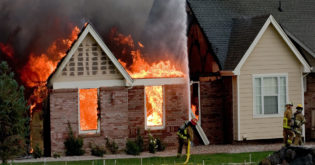Preventing Winter Home Fires
February 3, 2020 According to the U.S. Fire Administration (USFA), nearly 900 people die in winter home fires every year. Despite accounting for only 8% of total fires in the country annually, winter home fires result in 30% of all fire-related fatalities and more than $2 billion in property damages. Being informed on the common causes of winter home fires – and knowing life-saving safety tips for how to avoid them – are some of the best and most effective ways to prevent them from happening.
According to the U.S. Fire Administration (USFA), nearly 900 people die in winter home fires every year. Despite accounting for only 8% of total fires in the country annually, winter home fires result in 30% of all fire-related fatalities and more than $2 billion in property damages. Being informed on the common causes of winter home fires – and knowing life-saving safety tips for how to avoid them – are some of the best and most effective ways to prevent them from happening.
Every winter, the USFA takes time to remind families of the importance of staying vigilant about indoor fire safety. The two leading causes of winter home fires are cooking and having a heat source too closely placed to combustible material(s) – wood stoves and fireplaces are also known to cause house fires. The majority of these fires occur between 5 p.m. and 8 p.m.
Space Heater Safety
Some people use space heaters to keep their homes comfortable during colder months. Space heaters are devices used to heat small areas, such as single rooms. They are normally powered by electricity, though some run off fuel (such as wood pellets, natural gas, propane or fuel oil.) Space heaters often provide easy to use, low-cost alternatives to gas heating systems – but they can also be dangerous. While there is an array of flammable materials in people’s homes, some of the most likely culprits for starting a fire when placed too close to a space heater are:
- Curtains,
- Papers,
- Sofas and beds, and:
- Clothing
A good, general rule of thumb to remember for using space heaters is to place them a minimum of 3 feet away from all flammable materials. Additionally, space heaters should always have automatic shut-offs. Automatic shut-offs ensure that if the heater tips over, it immediately powers down. Here are a few more safety tips from the USFA for avoiding home fires while using space heaters:
- Regularly inspect space heaters for damaged or cracked cords or broken plugs,
- Never plug space heaters into power strips or extension cords – only plug them directly into wall outlets,
- If you use an oxygen tank, place it a minimum of 5 feet from space heaters (the 5 foot rule also applies to placing oxygen tanks near open flames, electrical devices, lighters, matches, and candles), and:
- Always place space heaters on flat, solid surfaces
Cooking: Fire Safety Tips
There are many ways to prevent cooking-related house fires from happening. One of the ways is to stay in the kitchen whenever boiling, grilling, broiling, or frying food – be sure to never leave it unattended. Keep things that can light on fire, such as wooden utensils, oven mitts, paper towels, curtain, food packaging, and cloth towels away from the stovetop. Same as space heaters, microwave ovens and other kitchen appliances should always be plugged directly into wall outlets, not into power strips or extension cords. Also, be sure to regularly inspect cords for any damage, cracks or breaks.
Here are some more tips to prevent cooking-related house fires:
- If there is a fire in your microwave, turn it off right away. Do not open the microwave door until the fire has gone out,
- If there is a fire in the oven and flames begin to come out, immediately leave your house and call 9-1-1 for help, and:
- If there is a fire in the oven and flames are not escaping it, turn the oven off and wait for the contents inside to cool down before cleaning
Lastly, the American Red Cross (ARC) says that some that one of its top fire prevention tips is to install smoke alarms on every level of the home – including inside and outside sleeping areas – and to test the alarms monthly, changing the batteries if necessary. The agency also recommends that individuals and families have fire escape plans they practice twice a year. If a house fire has started, get out, call for help, and stay out – do not go back inside for any reason.
If you have any questions about injuries or damages you sustained resulting from a house fire, someone at our firm can help. Please contact a representative directly.
Philadelphia Personal Injury Lawyers at Galfand Berger, LLP Representing Injured Individuals Since 1947
If you have a legal question or concern, please contact our Philadelphia personal injury attorneys. Galfand Berger has offices located in Philadelphia, Bethlehem, Lancaster, and Reading we serve clients throughout Pennsylvania and New Jersey. To schedule a consultation, call us at 800-222-8792 or complete our online contact form.
 Google Screened
Google Screened
